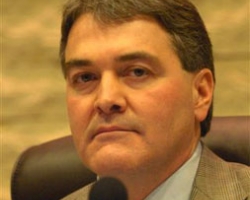The Chula Vista City Council on Tuesday postponed voting on four ballot initiatives that could appear before voters in November. The initiatives, which will be reconsidered next week, would give voters a chance to install more stringent term limits on elected officials, eliminate the city’s primary election system and establish district representation in the city.
Mayor Cheryl Cox summed up the mood of most of her colleagues by saying the issues being presented were too complex to rush them onto the ballot in one session.
“I got to tell you, these are thoughtful issues, and I just don’t see the good in rushing them,” said Cox.
The four proposed ballot measures, if added to the ballot and approved, have the potential to dramatically alter the way Chula Vista’s government functions.
Council members in Chula Vista are currently elected at large, meaning that the four members each represent the entire city.
Establishing districts, as many larger municipalities have done, would mean that each member is accountable to only a small section of the electorate.
Councilman Steve Castaneda said narrowing the electorate could help representatives focus on the needs of specific communities, and the city is large and diverse enough to accommodate distinct districts. Castaneda acknowledged there were pitfalls, like having council members who were too focused on their voters, to the detriment of the city as whole. But he said the smaller districts might also allow otherwise long shot candidates to be elected in their neighborhoods.
“In the long run, I think what it can do is help people from the neighborhood become viable candidates in their own community,” said Castaneda.
A proposal to establish term limits for the city attorney, limiting the holder of that office to two four-year terms, was also pushed off in favor of more discussion. One of the concerns raised was that when voters approved an elected city attorney position, they did not approve term limits for that position. In its report, city staff noted that Proposition Q, the measure that ultimately established the city attorney as an elected position, expressly did not include a provision for term limits. The lack of term limits was, in fact, one of the arguments used by opponents of Prop. Q.
Cox said that fact should not be lost.
“The voters clearly knew that term limits was not a part of the measure… Why does the council think they know better than the voters did?” she said.
Another ballot initiative that will be reconsidered was a proposal to eliminate the city’s primary system. Currently, council members face each other in a spring election, and if no one candidate receives more than 50 percent of the vote, the two highest vote winners participate in a fall runoff to determine the winner. Eliminating the primary system would mean that the highest vote getter would automatically be named to office.
Councilman Rudy Ramirez spoke in favor of another proposal, one that would institute more stringent term limits for city council members.
Currently, council members are limited to two consecutive four-year terms, but can serve again after sitting out for a one- year period.
The altered measure would mean that council members could serve only two terms for a lifetime.
Ramirez said that proposal had already been vetted by the charter review committee, and he has supported it in the past.
“I was in favor of the term limits for council members … that’s been through the charter review, and actually council voted on it two years ago. I was the one vote in favor of it, everyone else said no,” said Ramirez.
Councilman John McCann, along with his other colleagues, voiced concerns about the cost of the proposed ballot measures, which can run between $30,000 and $50,000 each in administrative costs for the election.
He also said there needed to be more outreach to the community, and more study, before rushing items before voters.
“Why the rush to get this on the ballot right now, what’s the urgency?” McCann asked.















